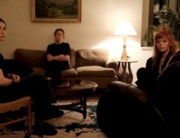
Based on Shyam Selvadurai’s 1994 novel, Funny Boy is a family drama set during the Sri Lankan Civil War and an epic tale of star-crossed lovers that calls back to epic romances of the past.
While the title refers to one character, Arjie, the film centers very much on a wealthy household in Colombo. The family are Tamil, one of the two major, and conflicting, ethnic groups of Sri Lanka. We follow Arjie, first at eight years old (played by Arush Nand) and then at 17 (Brandon Ingram). First, in the summer of 1974, Arjie’s aunt Radha (Agam Darshi) comes to stay with the family in their estate. She went to college in Toronto where she was turned onto feminism and gay culture. Though Arjie’s father and grandmother discourage his interest in women’s clothing, Radha takes Arjie under her wing, providing her room as a safe space for him to explore his “funny” (as his dad calls it) side. Radha has returned for an arranged marriage, but she has recently fallen in love with a man from the rival ethnic group, the Sinhalese.
The second section concerns Arjie in his Catholic high school. His peers can tell he’s gay, but his parents insist he’s straight despite all the evidence to the contrary. In Sri Lanka, not only is being gay against cultural and religious norms, it’s illegal, even to this day. At school, Arjie meets Shehan (Rehan Mudannayake), another young man of Sinhalese decent. Shehan’s father travels the world for work and brings back pieces of Western culture, such as music magazines featuring Boy George and Annie Lennox for his son. Shehan has figured out that in other parts of the world, being gay has become accepted. He tries to instill this prospect in Arjie, and the two begin a sexual relationship in secret. His story receives the most focus, but all of the story lines never quite come to full cohesion. More on that later.
A third story arc focuses on Jegan (Shivantha Wijesinha), a young man who works at Arjie’s father’s hotel and is involved in the Tamil Tigers, the militant separatist group at war with the Sinhalese dominated military. When tensions heat up between the two ethnic groups, Jegan’s landlord kicks him out of his apartment, so he goes to live with Arjie’s family and forms a bond with the mother. The three story lines concerning star-crossed lovers, arranged marriages, homosexuality, and violent protest are meant to converge somehow, but they never quite do.
Funny Boy is a wonderful looking film with rich scenery that cinematographer Douglas Koch takes advantage of, but it has structural issues that keep it from being as compelling as it aims to be. Jegan’s subplot is not as fully realized as the other two plots, and there is way too much time spent on Radha’s predicament, especially since it bears so little on the remainder of the film. Clearly by the title, Arjie’s sexuality is the primary focal point, but his story weaves in and out of Radha’s personal struggle and later Jegan’s and then the civil war. Perhaps this is a case of screenwriters not being able to narrow an expansive story down to two hours.






Leave A Comment